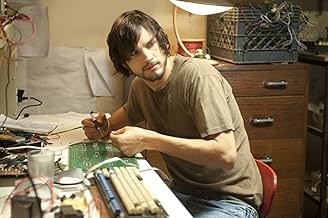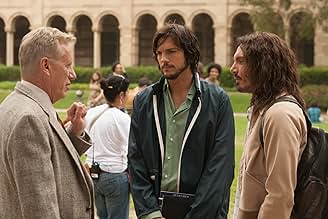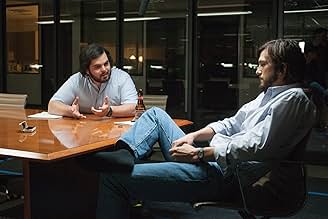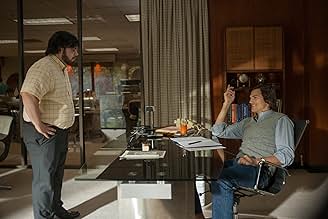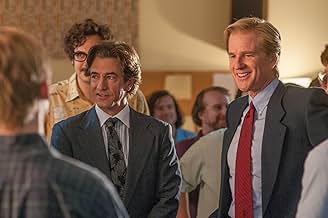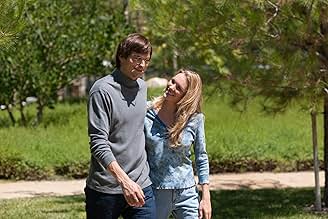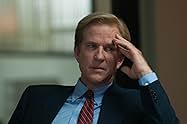Die Geschichte von Steve Jobs' Aufstieg vom Studienabbrecher zu einem der angesehensten Kreativunternehmer des 20. Jahrhunderts.Die Geschichte von Steve Jobs' Aufstieg vom Studienabbrecher zu einem der angesehensten Kreativunternehmer des 20. Jahrhunderts.Die Geschichte von Steve Jobs' Aufstieg vom Studienabbrecher zu einem der angesehensten Kreativunternehmer des 20. Jahrhunderts.
- Auszeichnungen
- 2 Nominierungen insgesamt
Empfohlene Bewertungen
I'm sure Steve Jobs fans have a thousand mistakes they like to point out and a thousand more complaints about his douchie portrayal. I have a more simpler complaint. This is no more than a simple made-for-TV movie. Ashton Kutcher is doing more mimicry than actually taking on the persona. I actually put most of this on the shoulders of director Joshua Michael Stern. There are too many Jobs speeches and pontifications. It's an easy way to copy Steve. Maybe it's too easy. It needs to go deeper.
Problem #1) You don't care for Jobs and you leave the theater not knowing Jobs. There are few emotional moments in the movie - except when you want to spit on him. Fire this person unnecessarily; deny that loyal employee well-earned benefit; use your wealth to destabilize the company... it all describes someone you are glad you don't know personally or professionally.
Problem #2) The movie is paced slower than my Aunt Minnie in a walker. I've seen paint dry faster.
Problem #3) The acting... maybe I should say the affectations. Kutcher over-emphasized Jobs odd gate and stance as if it meant something. But why distract us with an antalgic back, hyper-extension of the knees, increased lordosis and anterior propulsion? It distracted from the story and took me out of the movie every time.
Problem #4) The editing was horrible. Scenes would start and finish randomly - with no emotional content. Many scenes had no relationship to the structure of the movie - taking valuable time and adding little to nothing; disjointed would be too nice of a word.
Problem #5) The strange arc of the story-line ended before it began in earnest. The writing didn't explain how the apple II was able to sustain the many, many years of subsequent failures. Do corporations really build stockholders via "image", not performance? Metaphysically, I know that untalented a-holes who use, abuse and throw people away deserve to suffer. But we didn't see suffering. We see a fabulously wealthy person, whose emotional system was M.I.A, slide through life on the efforts of others.
There is no teaching moment in this movie. There is no emotional content. There are no memorable lines or moments. This isn't a movie; it feels more like revenge, cold and pointless.
Developing his imagination for computer programming at Atari, Steve Jobs (Ashton Kutcher) brings in his friend Steve Wozniak (Josh Gad) to help with the hardware aspect, forming a partnership that would soon lead to the founding and development of Apple Computers, a force within the industry throughout the 1980s. Steve is not prepared for the financial demands and the ruthless business mentality, and is eventually forced out of the company he began, only to return in the 1990s with a fresh game plan on how to bring Apple back into the public consciousness, and to dominate the industry once again.
"Jobs" is a biopic with a very narrow focus, and without any sense of risk or adventure. It is so intent on covering Jobs' entire corporate career, that it simply reduces his personal life to a footnote. Stern completely glosses over Jobs' personal life, which is essential to any self-respecting biopic. The entire production feels rushed and slapped together simply to benefit from being the first one out of the gate.
To his credit, Kutcher puts forth a good effort, and he undeniably looks the part of Steve Jobs. Unfortunately, Ashton always looks like he is trying too hard to play the part, and never fully becomes the character he's portraying. His limitations on the big screen prove to be a major liability. He has developed a screen persona as likable character, which has served him well with numerous TV sitcoms. Not so much with movies.
What emerges is a movie that has "a made for TV" feel, which depicts a self-absorbed creep who stabs everyone in the back to simply to get his way that goes on for two plus hours. A thoroughly unsatisfying tribute, and we are still left none the wiser as to what made "The Father of the Digital Revolution" beyond what we already know.
What does this film do well? The first half of it captures the look and feel of early home computing in a totally realistic way - the kind of people who were involved, the way that they dressed, what early homemade personal computers in the 1970s looked like. What did they look like? It was like the first cars when they were called "horseless carriages" because that's what people AND the inventors understood as the old paradigm. The horse was being replaced with an engine and the rest of the car looked like carriages always had looked. So the earliest computers had switches and lights and sat in unattractive blue boxes that engineers thought were great, but the average person had no idea what to do with such a thing and didn't want one.
What did this film do poorly? I'd say Steve Wozniak is presented as a mere shadow of himself here. You never see the camaraderie or dynamic between himself and Jobs. The old Home Brew Club looked up to Wozniak, and when he presents the first "Apple" computer to them they just look bored and Woz looks scared.
Finally I come to Ashton Kutcher. Ashton Kutcher's problem is that he did one of his earliest roles so well and so long - that of mega screw up Kelso in the long running TV comedy "That 70's Show". He did it so well in fact that I ALWAYS see Kelso whenever I see Kutcher, no matter how well he is performing. In this film I kept waiting for his 70's Show girlfriend, alpha female attack dog Jackie, to come jumping out of a dark corner and start yelling at him and tell him what a screw up he is. Kutcher can't help this. I call it "Norman Bates Syndrome" - the same thing that happened to Anthony Perkins. No matter what role Anthony Perkins took after Psycho, no matter how well he did it, he was always Norman Bates. You just kept waiting for him to hit somebody over the head and start preparing the body to add to his collection of stuffed animals/people.
This is not a terrible film on Jobs. Nobody does a bad job, and it is interesting from a history of personal computing perspective. I'd say see this one for the history, and watch the Fassbender rendition in "Steve Jobs" to get a feel for the essence of the man, who will always remain somewhat of an enigma.
Wusstest du schon
- WissenswertesAlmost all of the scenes involving Jobs' parents' house and garage were filmed in the actual Los Altos, California house and garage where Steve Jobs grew up in the 1970s.
- PatzerDuring the iPod introduction event, Steve Jobs refers to it as "the iPod". Jobs avoided preceding Apple devices with "the," rationalizing that doing so positioned a product as a representation of a user rather than as an inanimate object. In video of the event Jobs refers to the device as simply "iPod" without any definite or indefinite articles.
- Zitate
[last lines]
Steve Jobs: [narrating] Here's to the crazy ones. The misfits, the rebels, the troublemakers, the round pegs in the square holes, the ones who see things differently. They're not fond of rules, and they have no respect for the status quo. You can quote them, disagree with them, glorify or vilify them. About the only thing you can't do is ignore them. Because they change things - they push the human race forward. And while some may see them as the crazy ones, we see genius. Because the people who are crazy enough to think they can change the world, are the ones who do.
[speaking directly]
Steve Jobs: How was that?
- Crazy CreditsThe television advertisement in the film is named: "Iron Eyes Cody: People Start Pollution, People Can Stop It". It's credited as: "Iron Eyes Cody: People Start Pollution, People Can't Stop It".
- VerbindungenFeatured in The Tonight Show with Jay Leno: Folge #21.187 (2013)
- SoundtracksPeace Train
Performed by Cat Stevens (as Yusuf / Cat Stevens)
Written by Cat Stevens
Courtesy of Island Records Ltd.
Under license from Universal Music Enterprises
Top-Auswahl
Details
- Erscheinungsdatum
- Herkunftsländer
- Offizielle Standorte
- Sprache
- Auch bekannt als
- Jobs - Die Erfolgsstory von Steve Jobs
- Drehorte
- Produktionsfirmen
- Weitere beteiligte Unternehmen bei IMDbPro anzeigen
Box Office
- Budget
- 12.000.000 $ (geschätzt)
- Bruttoertrag in den USA und Kanada
- 16.131.410 $
- Eröffnungswochenende in den USA und in Kanada
- 6.713.900 $
- 18. Aug. 2013
- Weltweiter Bruttoertrag
- 42.128.352 $
- Laufzeit2 Stunden 8 Minuten
- Farbe
- Sound-Mix
- Seitenverhältnis
- 2.35 : 1







